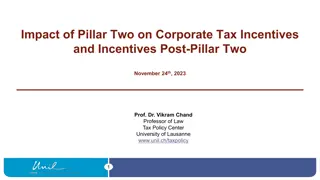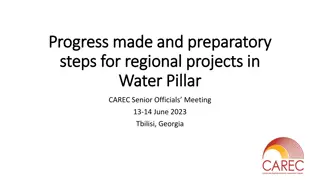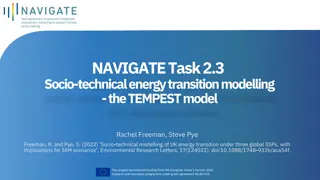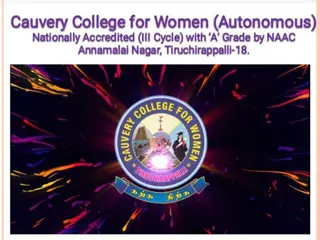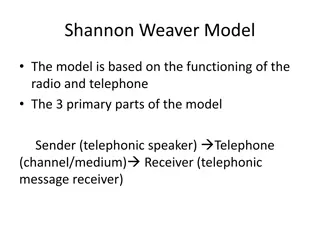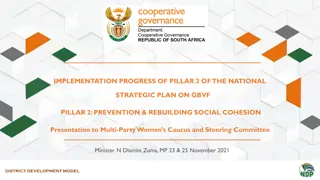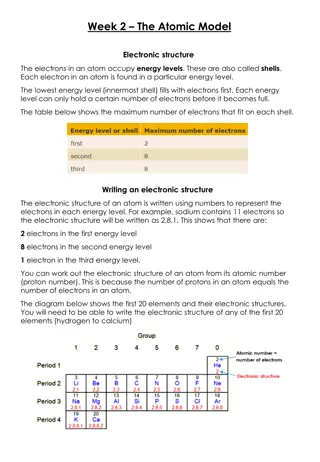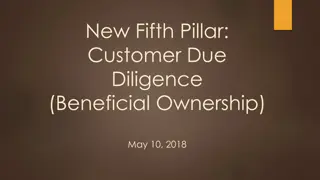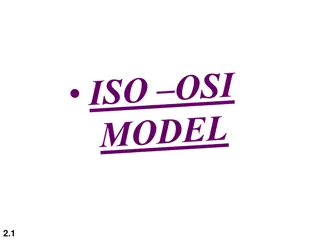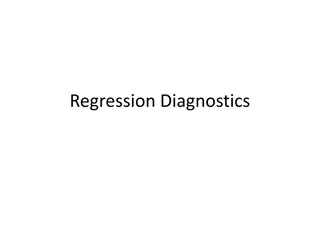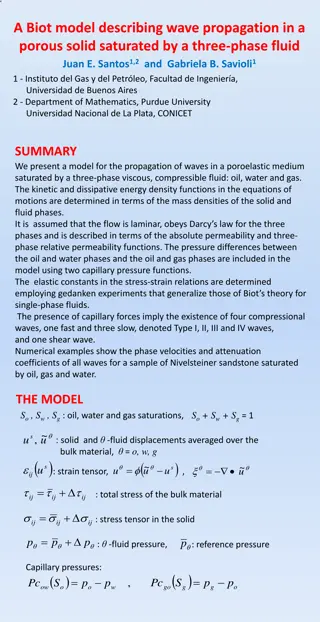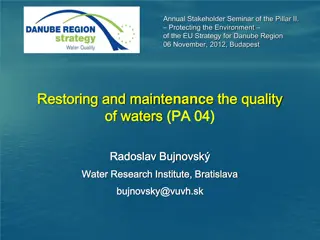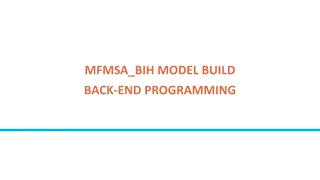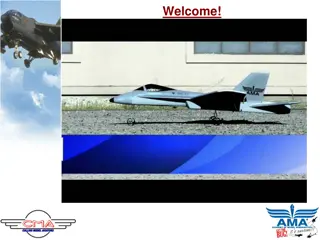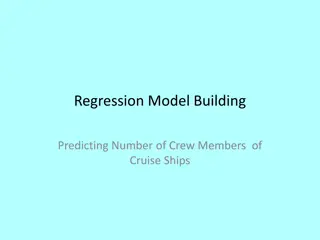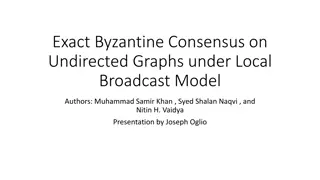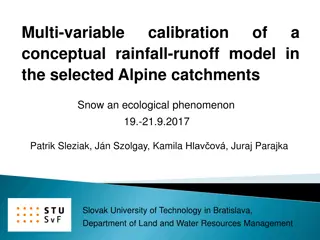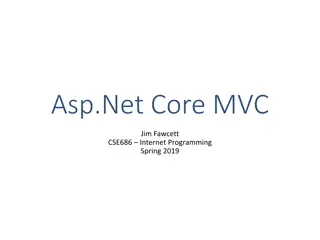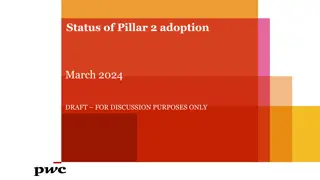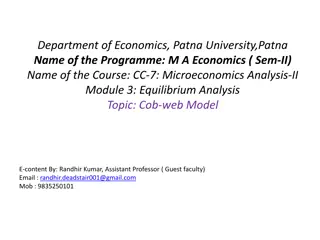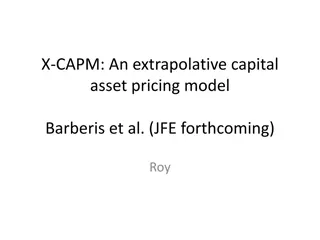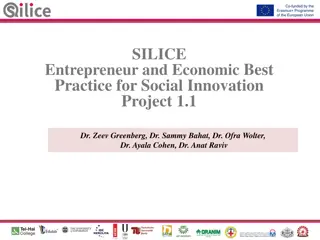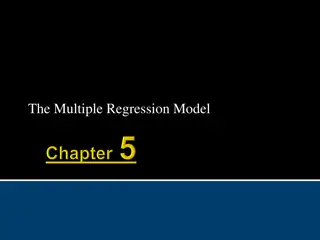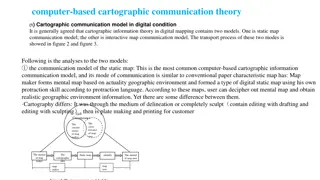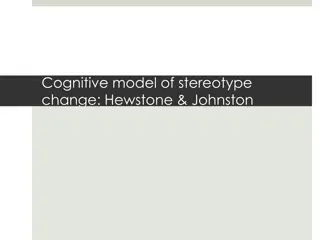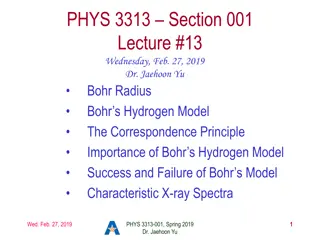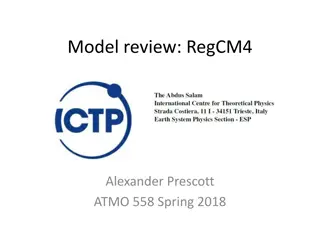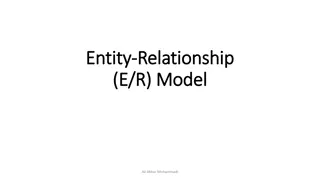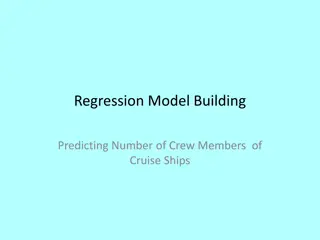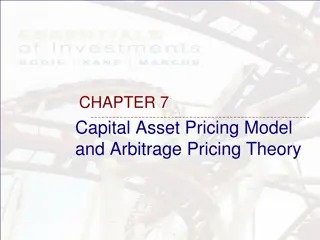Green Transition Pillar: Shaping the Green Transition Actions
The Green Transition Pillar outlines actions to support Member States in updating national climate adaptation strategies, uptake of climate-proofing guidance, and promoting tools for climate risk assessments. It encourages the use of green budgeting, green public procurement, and disaster resilience
4 views • 9 slides
Building a Macrostructural Standalone Model for North Macedonia: Model Overview and Features
This project focuses on building a macrostructural standalone model for the economy of North Macedonia. The model layout includes a system overview, theory, functional forms, and features of the MFMSA_MKD. It covers various aspects such as the National Income Account, Fiscal Account, External Accoun
2 views • 23 slides
NAMI Family Support Group Model Overview
This content provides an insightful introduction to the NAMI family support group model, emphasizing the importance of having a structured model to guide facilitators and participants in achieving successful support group interactions. It highlights the need for a model to prevent negative group dyn
6 views • 23 slides
Impact of Pillar Two on Corporate Tax Incentives Post-Pillar Two
This presentation by Prof. Dr. Vikram Chand discusses the impact of Pillar Two on corporate tax incentives, focusing on the scope, ETR calculation mechanism, and overall assessment. It covers different types of tax incentives, such as immediate expensing and deductions, and explains how Pillar Two a
4 views • 29 slides
Progress and Preparatory Steps for Regional Water Projects in CAREC Water Pillar
Progress and preparatory steps for regional water projects in the CAREC Water Pillar were discussed during the CAREC Senior Officials Meeting on 13-14 June 2023 in Tbilisi, Georgia. The initiative aims to promote sustainable, climate-resilient, and productive water systems in the region, focusing on
4 views • 5 slides
Everything You Need to Know About Pillar Drills
Learn about the components of a pillar drill, essential safety measures, and how it functions. Understand the roles of the motor, spindle, gears, feed lever, column, base, table, and chuck. Find out how to operate a pillar drill safely and efficiently, including using the correct speed, securing wor
1 views • 5 slides
Regional Framework for Action on Health and Climate Change
Regional Framework for Action on Health and Climate Change outlines pillars focusing on health protection from climate change through governance, policy, and engagement. It emphasizes building health systems resilience, multi-sectoral actions, and mobilizing support for public health responses. Pill
3 views • 6 slides
Socio-technical Energy Transition Modelling: The TEMPEST Model
A simulation model, TEMPEST, incorporating societal and political factors, evaluates UK energy transition under three global SSPs. It analyzes the importance of political capital and societal preferences in adopting mitigation measures. The model's results are compared to the IMAGE model, suggesting
1 views • 5 slides
Understanding Entity-Relationship Model in Database Systems
This article explores the Entity-Relationship (ER) model in database systems, covering topics like database design, ER model components, entities, attributes, key attributes, composite attributes, and multivalued attributes. The ER model provides a high-level data model to define data elements and r
0 views • 25 slides
Communication Models Overview
The Shannon-Weaver Model is based on the functioning of radio and telephone, with key parts being sender, channel, and receiver. It involves steps like information source, transmitter, channel, receiver, and destination. The model faces technical, semantic, and effectiveness problems. The Linear Mod
0 views • 8 slides
Progress Update on Pillar 2 of the National Strategic Plan on GBVF
This presentation highlights the progress made in implementing Pillar 2 of the National Strategic Plan on Gender-Based Violence and Femicide (GBVF). It focuses on prevention strategies and rebuilding social cohesion, aligning with national priorities and utilizing the District Development Model to t
0 views • 16 slides
Understanding Atomic Structure: Electrons, Energy Levels, and Historical Models
The atomic model describes how electrons occupy energy levels or shells in an atom. These energy levels have specific capacities for electrons. The electronic structure of an atom is represented by numbers indicating electron distribution. Over time, scientists have developed atomic models based on
0 views • 5 slides
Understanding the New Fifth Pillar of Customer Due Diligence
The Customer Due Diligence (CDD) Final Rule, effective from May 11, 2018, adds a crucial 5th pillar to Anti-Money Laundering (AML) Program requirements aimed at improving financial transparency and mitigating risks related to illicit transactions. The rule outlines key elements such as customer iden
4 views • 32 slides
Understanding ROC Curves and Operating Points in Model Evaluation
In this informative content, Geoff Hulten discusses the significance of ROC curves and operating points in model evaluation. It emphasizes the importance of choosing the right model based on the costs of mistakes like in disease screening and spam filtering. The content explains how logistical regre
7 views • 11 slides
Understanding the OSI Model and Layered Tasks in Networking
The content highlights the OSI model and layered tasks in networking, explaining the functions of each layer in the OSI model such as Physical Layer, Data Link Layer, Network Layer, Transport Layer, Session Layer, Presentation Layer, and Application Layer. It also discusses the interaction between l
1 views • 41 slides
Regression Diagnostics for Model Evaluation
Regression diagnostics involve analyzing outlying observations, standardized residuals, model errors, and identifying influential cases to assess the quality of a regression model. This process helps in understanding the accuracy of the model predictions and identifying potential issues that may aff
1 views • 12 slides
Model for Wave Propagation in Poroelastic Medium Saturated by Three-Phase Fluid
We introduce a model describing wave propagation in a porous solid saturated by a three-phase fluid (oil, water, and gas). The model considers kinetic and dissipative energy density functions, laminar flow obeying Darcy's law, and capillary pressure functions. Elastic constants are determined using
1 views • 4 slides
Pillar II Stakeholder Seminar: Protecting Danube Environment
The Annual Stakeholder Seminar of Pillar II focused on Protecting the Environment of the EU Strategy for the Danube Region in Budapest highlighted the importance of water quality maintenance. The seminar emphasized the need for collaborative efforts to address challenges related to water pollution a
0 views • 13 slides
MFMSA_BIH Model Build Process Overview
This detailed process outlines the steps involved in preparing, building, and debugging a back-end programming model known as MFMSA_BIH. It covers activities such as data preparation, model building, equation estimation, assumption making, model compilation, and front-end adjustment. The iterative p
0 views • 10 slides
Understanding Models of Sustainable Development in Environmental Engineering
Models of sustainable development play a crucial role in enhancing our comprehension of sustainability concepts, facilitating information gathering, analysis, and coordination, as well as educating professionals, policymakers, and the general public. The Three Pillar Basic Model is one of the renown
0 views • 7 slides
Proposal for Radio Controlled Model Aircraft Site Development
To establish a working relationship for the development of a site suitable for radio-controlled model aircraft use, the proposal suggests local land ownership with oversight from a responsible agency. Collins Model Aviators is proposed as the host club, offering site owner liability insurance throug
0 views • 20 slides
UBU Performance Oversight Engagement Framework Overview
Providing an overview of the UBU Logic Model within the UBU Performance Oversight Engagement Framework, this session covers topics such as what a logic model is, best practice principles, getting started, components of the logic model, evidence & monitoring components, and next steps. The framework
0 views • 33 slides
Regression Model for Predicting Crew Size of Cruise Ships
A regression model was built to predict the number of crew members on cruise ships using potential predictor variables such as Age, Tonnage, Passenger Density, Cabins, and Length. The model showed high correlations among predictors, with Passengers and Cabins being particularly problematic. The full
0 views • 16 slides
Exact Byzantine Consensus on Undirected Graphs: Local Broadcast Model
This research focuses on achieving exact Byzantine consensus on undirected graphs under the local broadcast model, where communication is synchronous with known underlying graphs. The model reduces the power of Byzantine nodes and imposes connectivity requirements. The algorithm involves flooding va
0 views • 7 slides
Calibration of Multi-Variable Rainfall-Runoff Model Using Snow Data in Alpine Catchments
Explore the calibration of a conceptual rainfall-runoff model in Alpine catchments, focusing on the importance of incorporating snow data. The study assesses the benefits of using multi-objective approaches and additional datasets for model performance. Various aspects such as snow cover, groundwate
0 views • 16 slides
Understanding Asp.Net Core MVC - Building Web Applications with Model-View-Controller Pattern
Asp.Net Core MVC is a framework for building web applications based on the Model-View-Controller pattern. The model manages application data and constraints, views present application state, and controllers handle requests and actions on the data model. Learn about the MVC structure, life cycle, mod
0 views • 22 slides
Global Overview of Pillar 2 Adoption Status (March 2024)
The status of Pillar 2 adoption as of March 2024 shows a mix of enacted, announced, and uncertain intentions across various countries. Effective dates for different taxation rules vary, with some deferred or yet to be confirmed. The implementation of Pillar Two among countries is ongoing, with certa
0 views • 6 slides
Understanding the Cob-Web Model in Microeconomics Analysis
The Cob-Web Model, first proposed by Nicholas Kaldor, explains cyclic fluctuations in farm product output and prices. It is based on lag concepts, with supply depending on previous prices in the agricultural sector. The model consists of three types of fluctuations: Convergent, Continuous, and Diver
0 views • 8 slides
Understanding X-CAPM: An Extrapolative Capital Asset Pricing Model
This paper discusses the X-CAPM model proposed by Barberis et al., which addresses the challenges posed by investors with extrapolative expectations. The model analytically solves a heterogeneous agents consumption-based model, simulates it, and matches various moments. It explores how rational inve
0 views • 23 slides
Innovation and Social Entrepreneurship Initiatives in Higher Education
This project focuses on establishing a leading center for promoting innovation and social entrepreneurship within higher education institutions. It aims to encourage students and staff to develop creative solutions for community challenges, expand social involvement, and foster sustainable positive
0 views • 13 slides
Principles of Econometrics: Multiple Regression Model Overview
Explore the key concepts of the Multiple Regression Model, including model specification, parameter estimation, hypothesis testing, and goodness-of-fit measurements. Assumptions and properties of the model are discussed, highlighting the relationship between variables and the econometric model. Vari
1 views • 31 slides
The Evolution of Cartographic Communication Theory in the Digital Age
Cartographic communication theory in digital mapping involves two models: the static map communication model and the interactive map communication model. The static map model follows traditional map-making methods adapted to digital tools, while the interactive map model leverages user feedback to r
0 views • 8 slides
Cognitive Model of Stereotype Change: Three Models Explored
The Cognitive Model of Stereotype Change, as researched by Hewstone & Johnston, delves into three key models for altering stereotypical beliefs: the bookkeeping model, the conversion model, and the subtyping model. These models suggest strategies such as adding or removing features to shift stereoty
0 views • 58 slides
Woodland Rotary Endowment - A Pillar of Service in Community
The Woodland Rotary Endowment is a charitable organization closely affiliated with the Rotary Club of Woodland, operating as a pillar of service within the community. Governed by a board of directors, it offers scholarships and charitable contributions while upholding the values of the Rotary Club.
0 views • 12 slides
Understanding Bohr's Model of the Hydrogen Atom
Exploring the significance of Bohr's hydrogen model in physics, this lecture delves into the Bohr radius, the correspondence principle, and the success and limitations of his model. Discover how characteristic X-ray spectra contribute to our understanding of atomic structures, leading to the conclus
0 views • 14 slides
Overview of RegCM4 Model Features
RegCM4 is a community model developed since the 1980s, with over 800 scientists contributing to its advancements. It features a fully compressible, rotating frame of reference and a limited area dynamical core based on the Penn State/NCAR Mesoscale Model 5 (MM5). The model uses hydrostatic and nonhy
0 views • 14 slides
Understanding Entity-Relationship Model in Databases
The Entity-Relationship Model (E/R Model) is a widely used conceptual data model proposed by Peter P. Chen. It provides a high-level description of the database system during the requirements collection stage. Entities represent things of independent existence, each described by a set of attributes.
0 views • 21 slides
Predicting Number of Crew Members on Cruise Ships Using Regression Model
This analysis involves building a regression model to predict the number of crew members on cruise ships. The dataset includes information on 158 cruise ships with potential predictor variables such as age, tonnage, passengers, length, cabins, and passenger density. The full model with 6 predictors
0 views • 15 slides
Understanding Model Bias and Optimization in Machine Learning
Learn about the concepts of model bias, loss on training data, and optimization issues in the context of machine learning. Discover strategies to address model bias, deal with large or small losses, and optimize models effectively to improve performance and accuracy. Gain insights into splitting tra
0 views • 29 slides
Understanding the Capital Asset Pricing Model (CAPM) and Arbitrage Pricing Theory
Explore the Capital Asset Pricing Model (CAPM) which relates expected returns to risk, learn about the Security Market Line (SML), single-index model, multi-factor models, and the Fama-French three-factor model. Discover the Nobel prize-winning Eugene Fama's contributions and dive into the Arbitrage
0 views • 52 slides



